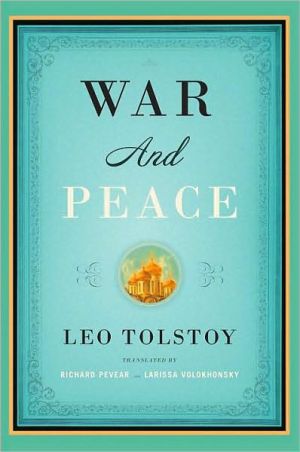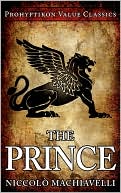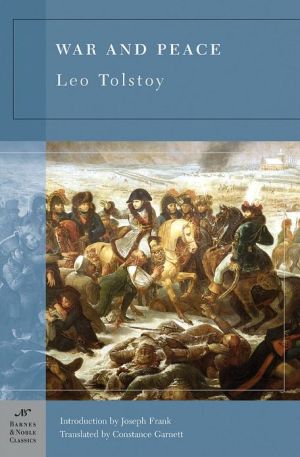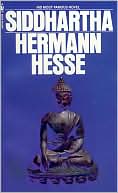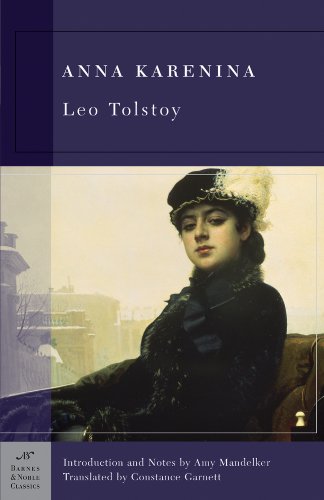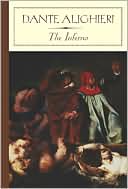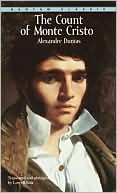War and Peace (Pevear / Volokhonsky Translation)
From the award-winning translators of Anna Karenina and The Brothers Karamazov comes this magnificent new translation of Tolstoy's masterwork.\ War and Peace broadly focuses on Napoleon’s invasion of Russia in 1812 and follows three of the most well-known characters in literature: Pierre Bezukhov, the illegitimate son of a count who is fighting for his inheritance and yearning for spiritual fulfillment; Prince Andrei Bolkonsky, who leaves his family behind to fight in the war against...
Search in google:
Often called the greatest novel ever written, War and Peace is at once an epic of the Napoleonic Wars, a philosophical study, and a celebration of the Russian spirit. Tolstoy’s genius is seen clearly in the multitude of fully realized and equally memorable characters that populate this massive chronicle. Out of this complex narrative emerges a profound examination of the individual’s place in the historical process, one that makes it clear why Thomas Mann praised Tolstoy for his Homeric powers and placed War and Peace in the same category as the Iliad: “To read him . . . is to find one’s way home . . . to everything within us that is fundamental and sane.”The Barnes & Noble ReviewWe might as well face it at the outset -- War and Peace is a big book. In length, obviously: nearly 1,250 pages in this translation by Richard Pevear and Larissa Volokhonsky. That makes it heavy to lug around, and when I read it in bed it left a dent in my sternum. And it requires a big commitment: unless you took the same speed reading course Woody Allen did (he read it in 20 minutes and reported: "It involved Russia"), it takes a big chunk out of your life to read. It's big in ambition, too: there's Tolstoy's, of course -- it took him more than ten years to write, research, and rewrite -- but closer to home, there's yours, if this is a mission you choose to accept. Reading War and Peace -- or being seen to do so -- is a sign that you are a Serious-to-the-Verge-of-Pretentious Person. The few times when I was caught reading it in public I felt sheepish.
Translated by Richard Pevear and Larissa Volokhonsky\ Part Three, XV\ At eight o’clock Kutuzov rode to Pratz at the head of Miloradovich’s fourth column, the one which was to take the place of the columns of Przebyszewski and Langeron, which had already gone down. He greeted the men of the head regiment and gave the order to move, thus showing that he intended to lead the column himself. Having ridden to the village of Pratz, he halted. Prince Andrei, one of the enormous number of persons constituting the commander in chief’s suite, stood behind him. Prince Andrei felt excited, irritated, and at the same time restrainedly calm, as a man usually is when a long-desired moment comes. He was firmly convinced that this was the day of his Toulon or his bridge of Arcole.[1] How it would happen, he did not know, but he was firmly convinced that it would be so. The locality and position of our troops were known to him, as far as they could be known to anyone in our army. His own strategic plan, which there obviously could be no thought of carrying out now, was forgotten. Now, entering into Weyrother’s plan, Prince Andrei pondered the possible happenstances and came up with new considerations, such as might call for his swiftness of reflection and decisiveness.\ To the left below, in the fog, exchanges of fire between unseen troops could be heard. There, it seemed to Prince Andrei, the battle would concentrate, there an obstacle would be encountered, and “it’s there that I’ll be sent with a brigade or division, and there, with a standard in my hand, I’ll go forward and crush everything ahead of me.”\ Prince Andrei could not look with indifference at the standards of the battalions going past him. Looking at a standard, he thought: maybe it is that very standard with which I’ll have to march at the head of the troops.\ By morning the night’s fog had left only hoarfrost turning into dew on the heights, but in the hollows the fog still spread its milk-white sea. Nothing could be seen in that hollow to the left, into which our troops had descended and from which came the sounds of gunfire. Over the heights was a dark, clear sky, and to the right–the enormous ball of the sun. Far ahead, on the other shore of the sea of fog, one could make out the jutting, wooded hills on which the enemy army was supposed to be, and something was discernible. To the right the guards were entering the region of the fog, with a sound of tramping and wheels and an occasional gleam of bayonets; to the left, beyond the village, similar masses of cavalry approached and disappeared into the sea of fog. In front and behind moved the infantry. The commander in chief stood on the road out of the village, letting the troops pass by him. Kutuzov seemed exhausted and irritable that morning. The infantry going past him halted without any command, apparently because something ahead held them up.\ “But tell them, finally, to form into battalions and go around the village,” Kutuzov said angrily to a general who rode up. “Don’t you understand, Your Excellency, my dear sir, that to stretch out in a defile through village streets is impossible when we’re marching against an enemy?”\ “I intended to form them up outside the village, Your Excellency,” said the general.\ Kutuzov laughed biliously.\ “A fine sight you’d be, lining up in view of the enemy, a very fine sight!”\ “The enemy’s still far off, Your Excellency. According to the disposition . . .”\ “The disposition!” Kutuzov exclaimed biliously. “Who told you that? . . . Kindly do as you’re ordered.”\ “Yes, sir!”\ “Mon cher,” Nesvitsky said to Prince Andrei in a whisper, “le vieux est d’une humeur de chien.”[2]\ An Austrian officer in a white uniform with green plumes on his hat rode up to Kutuzov and asked on behalf of the emperor whether the fourth column had started into action.\ Kutuzov turned away without answering him, and his gaze chanced to rest on Prince Andrei, who was standing close by. Seeing Bolkonsky, Kutuzov softened the angry and caustic expression of his gaze, as if aware that his adjutant was not to blame for what was going on. And, without answering the Austrian adjutant, he addressed Bolkonsky:\ “Allez voir, mon cher, si la troisième division a dépassé le village. Dites-lui de s’arrêter et d’attendre mes ordres.”[3]\ Prince Andrei had only just started when he stopped him.\ “Et demandez-lui si les tirailleurs sont postés,” he added. “Ce qu’ils font, ce qu’ils font!”[4] he said to himself, still not answering the Austrian.\ Prince Andrei galloped off to carry out his mission.\ Overtaking all the advancing battalions, he stopped the third division and ascertained that there was in fact no line of riflemen in front of our columns. The regimental commander of the front regiment was very surprised by the order conveyed to him from the commander in chief to send out riflemen. The regimental commander stood there in the full conviction that there were more troops ahead of him, and that the enemy was no less than six miles away. In fact, nothing could be seen ahead but empty terrain sloping away and covered with thick fog. Having ordered on behalf of the commander in chief that the omission be rectified, Prince Andrei galloped back. Kutuzov still stood in the same place and, his corpulent body sagging over the saddle in old man’s fashion, yawned deeply, closing his eyes. The troops were no longer moving, but stood at parade rest.\ “Very good, very good,” he said to Prince Andrei and turned to a general who stood there with a watch in his hand, saying it was time to move on, because all the columns of the left flank had already descended.\ “We still have time, Your Excellency,” Kutuzov said through a yawn. “We have time!” he repeated.\ Just then, from well behind Kutuzov, came shouts of regimental greetings, and these voices began to approach quickly along the whole extended line of the advancing Russian columns. It was clear that the one being greeted was riding quickly. When the soldiers of the regiment Kutuzov was standing in front of began to shout, he rode slightly to one side and, wincing, turned to look. Down the road from Pratz galloped what looked like a squadron of varicolored horsemen. Two of them rode side by side at a great gallop ahead of the rest. One, in a black uniform with white plumes, rode a bobtailed chestnut horse, the other, in a white uniform, rode a black horse. These were the two emperors with their suite. Kutuzov, with the affectation of a frontline veteran, ordered his standing troops to “attention” and, saluting, rode up to the emperor. His whole figure and manner suddenly changed. He acquired the look of a subordinate, unthinking man. With affected deference, which obviously struck the emperor Alexander unpleasantly, he rode up and saluted him.\ The unpleasant impression, like the remains of fog in a clear sky, passed over the emperor’s young and happy face and disappeared. He was somewhat thinner that day, after his illness, than on the field of Olmütz, where Bolkonsky had seen him for the first time abroad, but there was the same enchanting combination of majesty and mildness in his beautiful gray eyes, and the fine lips had the same possibility of various expressions, with a prevalent expression of good-natured, innocent youth.\ At the Olmütz review he was more majestic; here he was more cheerful and energetic. He was slightly flushed after galloping two miles and, reining in his horse, gave a sigh of relief and looked around at the faces of his suite, as young, as animated as his own. Czartoryski and Novosiltsev, and Prince Volkonsky and Stroganov, and the others, all richly clad, cheerful young men on splendid, pampered, fresh, only slightly sweaty horses, talking and smiling, stopped behind the sovereign. The emperor Franz, a ruddy, long-faced young man, sat extremely straight on his handsome black stallion and looked around him with a preoccupied, unhurried air. He called up one of his white adjutants and asked something. “Most likely what time they started,” thought Prince Andrei, observing his old aquaintance, and recalling his audience with a smile he was unable to repress. In the emperors’ suite there were picked fine young orderly officers, Russian and Austrian, from the guards and infantry regiments. Among them were grooms leading the handsome spare horses of the royalty in embroidered cloths.\ As fresh air from the fields suddenly breathes through an open window into a stuffy room, so youth, energy, and certainty of success breathed upon Kutuzov’s cheerless staff as these brilliant young men galloped up.\ “Why don’t you begin, Mikhail Larionovich?” the emperor Alexander hurriedly addressed Kutuzov, at the same time glancing courteously at the emperor Franz.\ “I am waiting, Your Majesty,” answered Kutuzov, inclining deferentially.\ The emperor cupped his ear, frowning slightly and showing that he had not heard properly.\ “I’m waiting, Your Majesty,” Kutuzov repeated (Prince Andrei noticed that Kutuzov’s upper lip twitched unnaturally as he said this “waiting”). “Not all the columns are assembled, Your Majesty.”\ The sovereign heard, but this reply clearly did not please him; he shrugged his slightly stooping shoulders, glanced at Novosiltsev, who stood nearby, as if complaining of Kutuzov by this glance.\ “We’re not on the Tsaritsyn Field,[5] Mikhail Larionovich, where you don’t start a parade until all the regiments are assembled,” said the sovereign, again glancing into the eyes of the emperor Franz, as though inviting him, if not to take part, at least to listen to what he was saying; but the emperor Franz went on looking around and did not listen.\ “That is just why I do not begin, Sire,” Kutuzov said in a ringing voice, as if to forestall the possibility of not being heard, and again something twitched in his face. “I do not begin, Sire, because we are not on parade and not on the Tsaritsyn Field,” he uttered clearly and distinctly.\ All the faces in the sovereign’s suite instantly exchanged glances with each other, expressing murmur and reproach. “Old as he may be, he should not, he simply should not speak that way,” these faces expressed.\ The sovereign looked fixedly and attentively into Kutuzov’s eyes, waiting to see if he would say something more. But Kutuzov, for his part, bowed his head deferentially and also seemed to be waiting. The silence lasted for about a minute.\ “However, if you order it, Your Majesty,” said Kutuzov, raising his head and again changing his tone to that of a dull, unthinking, but obedient general.\ He touched up his horse and, calling to him the column leader Miloradovich, gave him the order to advance.\ The troops stirred again, and two battalions of the Novgorodsky regiment and a battalion of the Apsheronsky regiment moved on past the sovereign.\ While this Apsheronsky battalion was marching by, ruddy-faced Miloradovich, with no greatcoat, in his uniform tunic and decorations and a hat with enormous plumes, worn at an angle and brim first, galloped ahead hup-two, and with a dashing salute, reined in his horse before the sovereign.\ “God be with you, General,” said the sovereign.\ “Ma foi, sire, nous ferons ce que qui sera dans notre possibilité, sire!”[6] he replied merrily, nevertheless calling up mocking smiles among the gentlemen of the suite with his bad French.\ Miloradovich turned his horse sharply and placed himself slightly behind the sovereign. The Apsherontsy, excited by the presence of the sovereign, marched past the emperors and their suite at a dashingly brisk pace, beating their feet.\ “Lads!” cried Miloradovich in a loud, self-assured, and merry voice, obviously so excited by the sounds of gunfire, the anticipation of battle, and the sight of his gallant Apsherontsy–his companions from Suvorov’s time–marching briskly past the emperors, that he forgot the sovereign’s presence. “Lads, it won’t be the first village you’ve taken!” he shouted.\ “We do our best, sir!” the soldiers shouted out.\ The sovereign’s horse shied at the sudden shout. This horse, who had carried the sovereign at reviews while still in Russia, also carried her rider here, on the field of Austerlitz, enduring the distracted nudges of his left foot, pricked up her ears at the sound of gunshots just as she did on the Field of Mars, understanding neither the meaning of the shots she heard, nor the presence of the emperor Franz’s black stallion, nor anything of what her rider said, thought, or felt that day.\ The sovereign turned with a smile to one of his retinue, pointing to the gallant Apsherontsy, and said something to him.\ XVI\ Kutuzov, accompanied by his adjutants, rode at a walk behind the carabineers.\ Having gone less than half a mile at the tail of the column, he stopped by a solitary, deserted house (probably a former tavern), where the road forked. Both roads went down the hill, and troops were marching along both.\ The fog began to lift, and enemy troops could be dimly seen about a mile and a half away on the heights opposite. To the left below, the gunfire was growing louder. Kutuzov stopped, talking with an Austrian general. Prince Andrei, standing slightly behind him, peered at the enemy and turned to an adjutant, wishing to borrow a field glass from him.\ “Look, look,” said this adjutant, looking not at the distant troops, but down the hill in front of him. “It’s the French!”\ The two generals and the adjutants began snatching at the field glass, pulling it away from each other. All their faces suddenly changed, and on all of them horror appeared. The French were supposed to be a mile and a half from us, and they suddenly turned up right in front of us.\ “Is it the enemy? . . . No! . . . Yes, look, he’s . . . for certain . . . What is this?” voices said.\ With his naked eye, Prince Andrei saw below, to the right, a dense column of French coming up to meet the Apsherontsy, no further than five hundred paces from where Kutuzov was standing.\ “Here it is, the decisive moment has come! Now it’s my turn,” thought Prince Andrei, and, spurring his horse, he rode up to Kutuzov.\ “The Apsherontsy must be stopped, Your Excellency!” he cried.\ But at that same moment everything became covered with smoke, there was the sound of gunfire nearby, and a na-vely frightened voice two steps from Prince Andrei cried: “Well, brothers, that’s it for us!” And it was as if this voice was a command. At this voice everyone began to run.\ Confused, ever increasing crowds came running back to the place where, five minutes before, the troops had marched past the emperors. Not only was it difficult to stop this crowd, but it was impossible not to yield and move back with it. Bolkonsky tried only not to be separated from Kutuzov and looked around in perplexity, unable to understand what was happening in front of him. Nesvitsky, looking angry, red, and not like himself, shouted to Kutuzov that if he did not leave at once, he would certainly be taken prisoner. Kutuzov stood in the same place and, without responding, took out his handkerchief. Blood was flowing from his cheek. Prince Andrei forced his way to him.\ “Are you wounded?” he asked, barely able to control the trembling of his lower jaw.\ “The wound isn’t here, it’s there!” said Kutuzov, pressing the handkerchief to his wounded cheek and pointing to the fleeing men.\ “Stop them!” he cried, and at the same time, probably realizing that it was impossible to stop them, spurred his horse and rode to the right.\ A fresh crowd of fleeing men streamed past, caught him up, and carried him backwards.\ The troops were fleeing in such a dense crowd that, once one landed in the middle of it, it was difficult to get out. Someone shouted, “Keep going, don’t drag your feet!” Another, turning around, fired into the air; someone else struck the horse on which Kutuzov himself was riding. Extricating themselves with the greatest effort from the flow of the crowd to the left, Kutuzov and his suite, diminished by more than half, rode towards the sounds of nearby cannon fire. Extricating himself from the crowd of fleeing men, Prince Andrei, trying to keep up with Kutuzov, saw on the slope of the hill, amidst the smoke, a Russian battery still firing, and the French running up to it. Slightly higher stood Russian infantry, neither moving ahead to aid the battery, nor backwards in the direction of the fugitives. A general on horseback separated himself from the infantry and rode up to Kutuzov. There were only four men left in Kutuzov’s suite. They were all pale and exchanged glances silently.\ “Stop those villains!” Kutuzov said breathlessly to the regimental commander, pointing to the fleeing men; but at the same moment, as if in punishment for those words, bullets, like a flock of birds, flew whistling at the regiment and Kutuzov’s suite.\ The French had attacked the battery and, seeing Kutuzov, were shooting at him. With this volley, the regimental commander seized his leg; several soldiers fell, and an ensign holding a standard let it drop from his hands; the standard wavered and fell, stopped momentarily by the bayonets of the soldiers around it. The soldiers began firing without any orders.\ “Oooh!” Kutuzov moaned with an expression of despair and looked around. “Bolkonsky,” he whispered in a voice trembling with awareness of his old man’s strengthlessness. “Bolkonsky,” he whispered, pointing to the disordered battalion and the enemy, “what’s going on?”\ But before he finished saying it, Prince Andrei, feeling sobs of shame and anger rising in his throat, was already jumping off his horse and running towards the standard.\ “Forward, lads!” he cried in a childishly shrill voice.\ “Here it is!” thought Prince Andrei, seizing the staff of the standard and hearing with delight the whistle of bullets, evidently aimed precisely at him. Several soldiers fell.\ “Hurrah!” cried Prince Andrei, barely able to hold up the heavy standard, and he ran forward with unquestioning assurance that the entire battalion would run after him.\ And indeed he ran only a few steps alone. One soldier started out, another, and the whole battalion, with a shout of “Hurrah!” rushed forward and overtook him. A sergeant of the battalion ran up, took the standard that was wavering in Prince Andrei’s hands because of its weight, but was killed at once. Prince Andrei again seized the standard and, dragging it by the staff, ran with the battalion. Ahead of him he saw our artillerists, some of whom were fighting, while others abandoned the cannon and came running in his direction; he also saw French infantrymen, who had seized the artillery horses and were turning the cannon. Prince Andrei and his battalion were now twenty paces from the cannon. Above him he heard the unceasing whistle of bullets, and soldiers ceaselessly gasped and fell to right and left of him. But he did not look at them; he looked fixedly only at what was happening ahead of him–at the battery. He clearly saw the figure of a red-haired gunner, his shako knocked askew, pulling a swab from one side, while a French soldier pulled it towards him from the other side. Prince Andrei saw clearly the bewildered and at the same time angry expression on the faces of the two men, who evidently did not understand what they were doing.\ “What are they doing?” Prince Andrei wondered, looking at them. “Why doesn’t the red-haired artillerist run away, since he has no weapon? Why doesn’t the Frenchman stab him? Before he runs away, the Frenchman will remember his musket and bayonet him.”\ In fact, another Frenchman with his musket atilt ran up to the fighting men, and the lot of the red-haired artillerist, who still did not understand what awaited him and triumphantly pulled the swab from the French soldier’s hands, was about to be decided. But Prince Andrei did not see how it ended. It seemed to him as though one of the nearest soldiers, with the full swing of a stout stick, hit him on the head. It was slightly painful and above all unpleasant, because the pain distracted him and kept him from seeing what he had been looking at.\ “What is it? am I falling? are my legs giving way under me?” he thought, and fell on his back. He opened his eyes, hoping to see how the fight between the French and the artillerists ended, and wishing to know whether or not the red-haired artillerist had been killed, whether the cannon had been taken or saved. But he did not see anything. There was nothing over him now except the sky–the lofty sky, not clear, but still immeasurably lofty, with gray clouds slowly creeping across it. “How quiet, calm, and solemn, not at all like when I was running,” thought Prince Andrei, “not like when we were running, shouting, and fighting; not at all like when the Frenchman and the artillerist, with angry and frightened faces, were pulling at the swab–it’s quite different the way the clouds creep across this lofty, infinite sky. How is it I haven’t seen this lofty sky before? And how happy I am that I’ve finally come to know it. Yes! everything is empty, everything is a deception, except this infinite sky. There is nothing, nothing except that. But there is not even that, there is nothing except silence, tranquillity. And thank God! . . .”\ NOTES\ [1] On 17 November 1796, fighting the Austrians in northern Italy, Napoleon, at the head of his grenadier and with a banner in this hand, charged onto the bridge at Arcole to keep the enemy from taking it. The plague that was raging in Jaffa when the French stormed the city afflicted both the local population and the French army. Napoleon visited the plague victims in the hospital with his marshals Berthier and Bessières, an incident commemorated by the French painter Jean-Antoine Gros (1771-1835) in The Plague Victims of Jaffa (1804).\ [2] My dear . . . the old man’s in a foul humor.\ [3] Go and see, my dear, if the third division has passed the village. Tell him to stop and wait for my orders.\ [4] And ask him if the riflemen are posted . . . What they’re doing, what they’re doing!\ [5] A square in Petersburg used as a parade ground. In 1818 the name was changed to Marsovo Polie (“the Field of Mars”).\ [6] By my faith, Sire, we will do that what which will be within our possibility, Sire!
\ From the Publisher“Shimmering. . . . [It] offers an opportunity to see this great classic afresh, to approach it not as a monument but rather as a deeply touching story about our contradictory human hearts.” \ —Michael Dirda, The Washington Post Book World\ “A major new translation . . . [which] brings us the palpability [of Tolstoy's characters] as perhaps never before. . . . Pevear and Volokhonsky's new translation gives us new access to the spirit and order of the book.”\ —James Wood, The New Yorker\ “Excellent. . . . An extraordinary achievement. . . . Wonderfully fresh and readable. . . . The English-speaking world is indebted to these two magnificent translators for revealing more of its hidden riches than any who have tried to translated the book before.”\ —Orlando Figes, The New York Review of Books\ "Tolstoy's War and Peace has often been put in a league with Homer's epic poems; it seems to me that the same might be said for Pevear and Volokhonsky's translation of his great novel. . . . Their efforts convey a much closer equivalent in English to the experience of reading the original."\ —Michael Katz, New England Review\ Full review here: http://www.nereview.com/29-4/29-4Katz.htm\ \ \ \ \ \ Michael Dirda…a fine new translation, especially one by the widely acclaimed team of Richard Pevear and Larissa Volokhonsky, offers an opportunity to see this great classic afresh, to approach it not as a monument (or mausoleum) but rather as a deeply touching story about our contradictory human hearts. Stressing that their War and Peace sticks more closely to the Russian text than any other, including Louise and Aylmer Maude's semi-canonical 1923 version, Pevear and Volokhonsky retain the considerable amount of French used by Tolstoy's counts and princesses, preserve the author's penchant for word repetition and aim to match his tidy syntactic conciseness. The result certainly reads smoothly, its English being neither egregiously contemporary nor inappropriately old-fashioned. In this respect, the Pevear-Volokhonsky War and Peace joins company with recent translations of The Tale of Genji, Don Quixote and In Search of Lost Time, these being among the few works of classic fiction equal to Tolstoy's in scope and richness.\ —The Washington Post\ \ \ The Barnes & Noble ReviewWe might as well face it at the outset -- War and Peace is a big book. In length, obviously: nearly 1,250 pages in this translation by Richard Pevear and Larissa Volokhonsky. That makes it heavy to lug around, and when I read it in bed it left a dent in my sternum. And it requires a big commitment: unless you took the same speed reading course Woody Allen did (he read it in 20 minutes and reported: "It involved Russia"), it takes a big chunk out of your life to read. It's big in ambition, too: there's Tolstoy's, of course -- it took him more than ten years to write, research, and rewrite -- but closer to home, there's yours, if this is a mission you choose to accept. Reading War and Peace -- or being seen to do so -- is a sign that you are a Serious-to-the-Verge-of-Pretentious Person. The few times when I was caught reading it in public I felt sheepish.\ I'm not trying to be flippant. Since reading War and Peace over the summer, I've come to think that everything important one takes away from it is due to its size. Because Tolstoy deals with world-historical events like Napoleon's invasion of Russia, the book could feel like potted history. But Tolstoy cannily uses the vast space at his disposal to make the experience of reading about these bygone battles and people both real and made-up seem rounded and authentic. At one end of the scale, he periodically stops the flow of time and action to contemplate lots of stuff that doesn't fit in a narrative sequence: the presumptuousness of human ambition, the limitations of our ability to analyze the reasons why things happen as they do, the differing roles of the historian and the novelist.\ At the other end of the scale, Tolstoy positively luxuriates in small moments, lounging about in details that a tough-minded editor would cut on grounds of space and yet which stay in my mind far longer than abstractions, no matter how profound. There's an exhilarating moment when Denisov, a short hussar with a speech impediment whom none of the women ever takes seriously, moves to the floor to dance the mazurka: "On the downbeat, he gave his lady a victorious and jocular sidelong look, unexpectedly stamped his foot [and] bounced off the floor springily.... [S]preading his legs, he stopped on his heels, paused like that for a second, tapped his feet in place with a clanking of spurs, spun quickly, then, tapping his right ankle with his left foot, again flew along in a circle." There's the old nanny Anna Makarovna, who has a trick that never fails to thrill the children (and me): "[B]y a secret known only to herself, Anna Makarovna knitted [two stockings] at once on her needles, and which she always drew triumphantly one out of the other before the children, when the stockings were finished." (By the way, there's video online of knitters who can perform Anna Makarovna's trick -- and a lot of them quote Tolstoy.) These are moments when a private piece of a person's character flashes out; Tolstoy grants us the ability to glimpse and understand these moments intimately, but how many times in life have we seen such moments and missed them?\ Tolstoy has us enter his imposing edifice through a frippery occasion, although the hostess, Anna Pavlovna, wouldn't thank us for saying so. She has carved out a niche in political soirées where everybody speaks the best French. Tolstoy likens her to a factory owner who keeps the spindles and wheels running smoothly. Why begin here? Well, for one thing, we get a glimpse of the people inhabiting the corridors of power in Russia, with public grandstanding and private influence peddling, and we also experience for ourselves the shiny banality of their faces, clothes, smiles, and conversation. For another, we meet the two main male characters, neither of whom fits comfortably into this world. The aristocratic newlywed Prince Andrei ought to, and yet he holds himself sardonically aloof, even from his cute little pet of a wife. Pierre Bezukhov, the illegitimate son of a dying count, is a bit more of an outsider, newly arrived from Paris and eager to enter into the swing of things. He is merely inadvertently awkward.\ Life is so messy and disorganized -- or, conversely, so structured by outside forces -- that it's hard to know which man has adopted the better strategy for coping. Neither, though, is happy with his choice; both come up against a moment that seems to call them imperiously to some more authentic way of living. I think of Rilke, faced with an implacable ancient torso of Apollo: "You must change your life." Easier said than done. Tolstoy's Napoleon hasn't an inkling of that kind of heroism. And how to persuade us of its possibility, let alone accomplishment, in fiction?\ I come back to size. Ever since high school English, I've distrusted short stories with that moment of epiphany that's supposed to betoken a cataclysmic change of heart. Even the most skilful -- Joyce's "The Dead," say, or Flannery O'Connor's "Revelation" -- don't really manage to overcome my suspicion that the life that will continue after the story stops wouldn't really turn out to be all that different. Give me a good couple hundred pages at least to see how someone can muster the will over the long haul to change his life. Tolstoy gives us plenty more than that, allowing his characters the room they need to develop in credible ways.\ War and Peace covers a long span of time -- about 15 years all told. And precisely because it can seem to take almost as long to read, whatever change characters undergo -- or choose -- feels real. Take Natasha: to my mind charming even when infuriating, she starts as an ardent 13 and ends a very different figure at 27 -- but that's such a stage of flux that it's not surprising. (I can't resist quoting: "She valued the society of the people to whom, disheveled, in a dressing gown, she could come striding out of the nursery with a joyful face and show a diaper with a yellow instead of a green stain, and hear comforting words that the baby was now much better.") Lying wounded on the battlefield of Austerlitz, the initially cynical Prince Andrei has a vision of the eternal that alters everything about his life -- but precisely because it's so far out of everyday experience he cannot express it to anyone. Tolstoy, however, opens Andrei's heart to us in a way that makes what is inexpressible entirely believable. And then there is Pierre. He begins as an overgrown frat boy, bumbles into a spiritual conversion, hatches a ludicrous plan to alter the course of history...what a mess! He's also fat and conversationally a bit odd, which makes it all the harder for a lot of people in and out of the novel to take him seriously. And yet by the end, we see him become magnanimous, even wise. How has this come to be?\ Pierre is (if I were forced to choose) my favorite character, and the constant effort of his inner self's unfolding -- seeking, striving, losing its way, giving up, regrouping -- is for me the most compelling plot line. Through a typically human combination of ill-informed choice and accident, Pierre becomes a common prisoner of war when the French reach Moscow. But something odd happens when he shares a life of imprisonment with ordinary foot soldiers: "The very qualities which, in the world he formerly lived in, were, if not harmful, at least a hindrance to him -- his strength, his scorn of life's comforts, his absentmindedness, his simplicity -- here, among these people, gave him almost the status of a hero. And Pierre felt that this view obliged him." Are we here witnessing in Pierre, about one thousand pages in, a real understanding of what humans owe each other, a true conversion? Maybe so -- but it doesn't mean there aren't a few slips, follies, and downright failures in his future. And that feels authentic, too.\ I've read War and Peace once before, at 21, and vividly remember holding forth in class about it. It was chastening this summer to discover that I'd forgotten almost everything about the novel except that it involved Russia. Fortunately, the bits I did remember -- the Battle of Austerlitz, the scenes from family life at the end -- were still compelling. There were many times in the past few months when Tolstoy's world became my world. Sometimes I'd just slip in for a little visit -- reading a chapter or two (almost all are conveniently short) standing by the stove while waiting for the coffee water to boil or sitting in the car in the interstices of suburban-mother carpooling. At night I would fall into it for chapters at a time, and snatches of Tolstoy would roll about my head during the day, such as the memory of Andrei falling in love despite himself: " 'And what makes her happy?' Prince Andrei asked himself with involuntary curiosity." Or the bedtime prayer of Platon, a peasant whose life seems to have no discernable shape: "So there, Lord, lay me down like a stone, raise me up like a loaf." I hope never to witness a wolf hunt or a mob baying for the blood of a scapegoat, but there's been time for them, too, in Tolstoy's vast narrative expanse.\ The novel is so long there's even time to be bored every now and then. I say this, by the way, as a compliment. "Bored" might be the wrong word; what I mean to describe are moments when nothing much to my mind is happening, or nobody I like is talking. My longueurs are probably not yours. But such moments are part of life, too, and have their own lessons. Long novels, I find, teach me patience with characters and ideas that would be easy to turn away from in life (and short fiction). Natasha's younger brother Petya may dream of the tsar, Mother Russia, and glory in battle in ways I don't find congenial, and yet I feel more tender toward what I see as his foolish gallantry than I might have if I had not encountered them in the context of Tolstoy's enormous canvas. I also have Petya to thank for the hypersensitive description of nocturnal waiting for the dawn of battle, just as memorable as Henry V walking the fields incognito the night before Agincourt: "Drops dripped. Quiet talk went on. Horses neighed and scuffled. Someone snored."\ So the short version is: I loved my summer of War and Peace and am grateful for the translation that inspired me to read the novel again. I don't know any Russian, but I have read a number of other translations by Pevear and Volokhonsky -- most memorably, for me, their Brothers Karamazov, which was an absolute revelation. It was like a brilliantly cleaned painting, bringing out thrilling touches, caustic details, and even grimly funny highlights that just hadn't appeared to nonexperts before. This Tolstoy translation doesn't sound at all like the other ones of theirs I've read, but then, of course it's a different book. At first, I found the language stilted and artificial; it made the party scenes and military planning meetings that open the book slightly slow-going for me. And yet isn't that part of the point? I quite like the decision they made about the French conversations in the original. They leave them untranslated in the text (which means you can tell when characters are speaking in French and speculate about why they might be doing so), but they render them in English in notes at the bottom of the page. Pevear and Volokhonsky also have scads of historical and explanatory commentary tucked in the back, which I mostly ignored in the full flood of reading but which made a kind of fun self-quiz when I'd finished.\ For anyone who still hasn't had enough of War and Peace, there's another translation newly available -- this one of Tolstoy's first version of the novel. When it reappeared in Russia a few years ago, the publisher pushed it as "half the usual length, less war and more peace, no philosophical digressions." Tolstoy had apparently thought of calling it All's Well That Ends Well. You'd be quite correct to think that it's a rather different book from the one he went on to write. Andrew Bromfield, the English translator, gamely tries to make the case that even first-time readers of the novel will enjoy it, but since most of his descriptions of what's truly interesting about the book lie in comparing the two versions, it makes more sense to read the famous longer one first. And as if all this weren't enough, I've been intrigued by the unabridged audiobook Naxos puts out -- 70 hours over a span of 51 CDs. It sounds like a big project for all concerned, but summer will be here before I know it. --Alexandra Mullen\ Alexandra Mullen left a life as an academic in Victorian literature to return to her roots as a general reader. She now writes for The Hudson Review (where she is also an Advisory Editor), The New Criterion, and The Wall Street Journal.\ \ \
